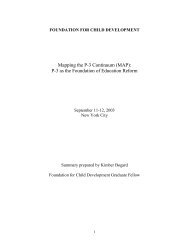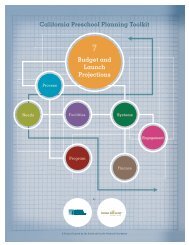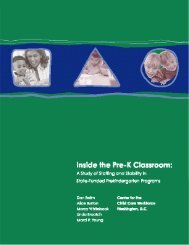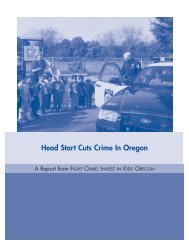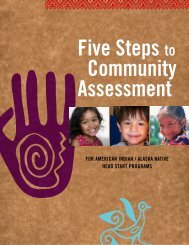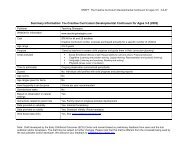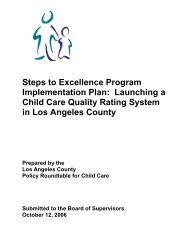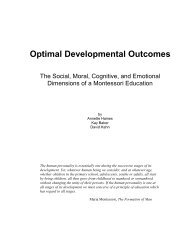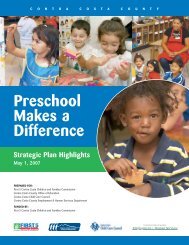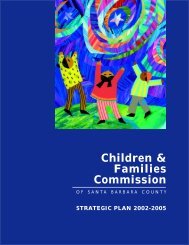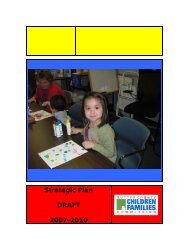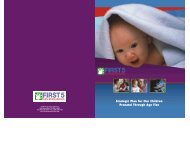Download this file - Plan4Preschool
Download this file - Plan4Preschool
Download this file - Plan4Preschool
Create successful ePaper yourself
Turn your PDF publications into a flip-book with our unique Google optimized e-Paper software.
through age seven). Even Start is primarily a state-administered discretionary grant<br />
program. Through a competitive process, states fund integrated family literacy services<br />
that include early childhood education, adult literacy or adult basic education, and<br />
parenting education. Local educational agencies, other public entities, and communitybased<br />
organizations collaborate to provide services in 81 projects in California. Projects<br />
may be funded for four years, contingent on adequate annual progress on Even Start<br />
performance indicators for adults and children.<br />
The William F. Goodling Even Start Family Literacy Program began in 1989 and was<br />
reauthorized in 2001 as Title I, Part B, Subpart 3 of NCLB. For more information on<br />
Even Start, contact the Child Development Division, Even Start Office, at<br />
(916) 319-0848. Additional information is also available on the Even Start Web site at<br />
http://www.cde.ca.gov/sp/cd/op/evenstart.asp.<br />
American Indian Education Centers<br />
In 1974, California set an example for the nation in its goal to honor historical<br />
obligations to educate American Indian people by establishing the American Indian<br />
Education Center Program. Created through legislation (Senate Bill 2264: California<br />
Education Code Article 6, sections 33380—33383), the program is intended to offer<br />
educational services that promote American Indian student academic success by<br />
providing community-based programs to address the unique academic and cultural<br />
needs of American Indian students in California public schools. American Indian<br />
Education Center staff assists schools with professional development, counseling,<br />
tutorial services, and parental education. Staff members also provide supplemental and<br />
extended-day instructional programs to meet the needs of American Indian students.<br />
For more information on American Indian Education Centers, contact Judy Delgado,<br />
Consultant, Migrant, Indian, and International Education Office, at (916) 319-0506 or by<br />
e-mail at judelgado@cde.ca.gov. Additional information is available on the American<br />
Indian Education Web site at http://www.cde.ca.gov/sp/ai.<br />
Coordinated School Health<br />
Only when students are healthy can schools fully meet their goals. If school-age<br />
children are not in good health, they are less attentive, unable to keep up with their<br />
demanding schedules, and more likely to miss school due to illness—all factors<br />
hindering academic achievement. Therefore, schools need to address health-related<br />
concerns and provide students with the knowledge to prevent health-related problems.<br />
Coordinated school health addresses eight different aspects of health and education:<br />
health education; physical education; health services; nutrition services; counseling,<br />
psychological, and social services; healthy school environment; health promotion for<br />
staff; and parent and community involvement. The coordinated school health model<br />
promotes collaboration—school staff, families, youths, and communities working<br />
together to address these components.<br />
66



